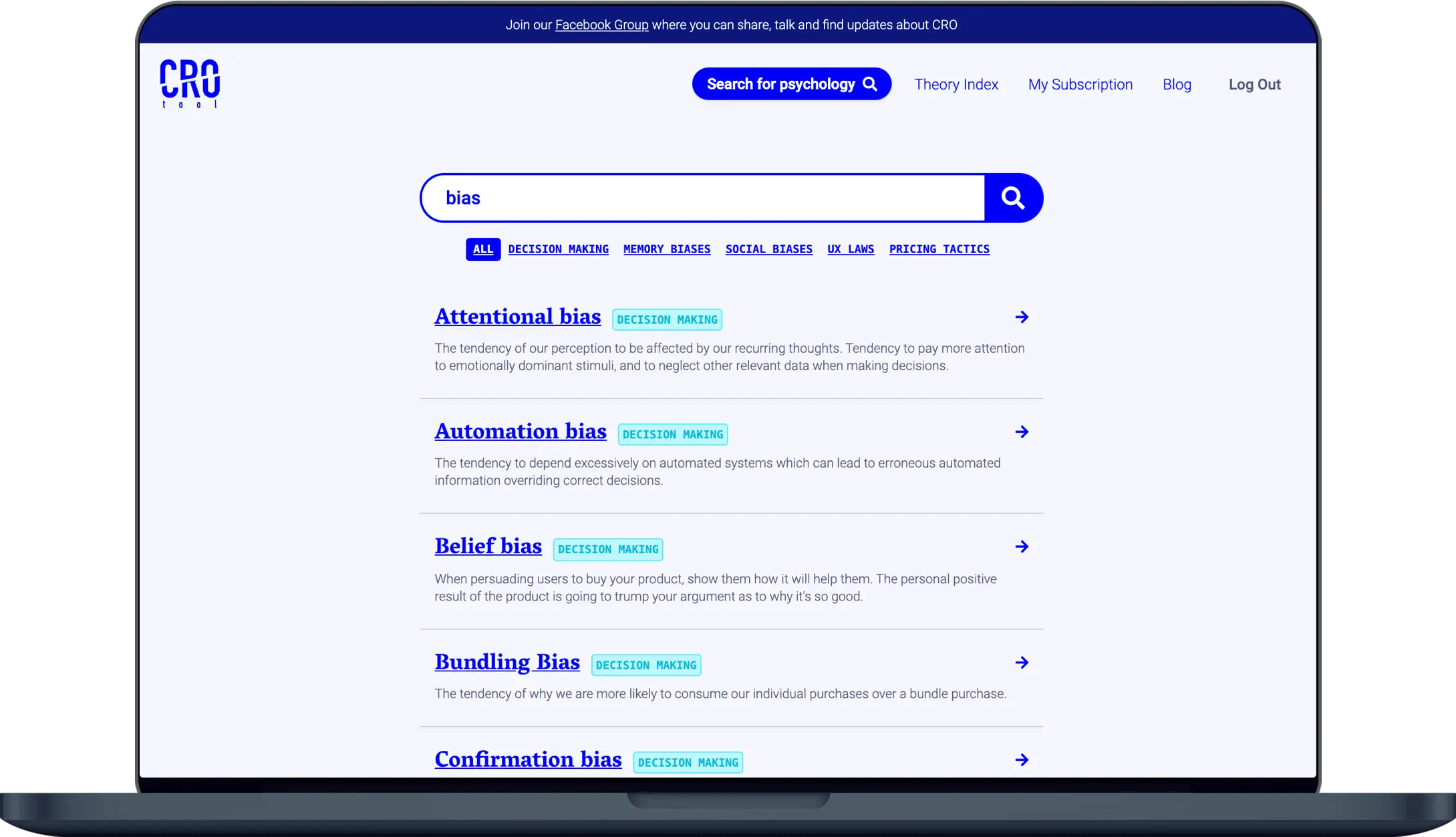
The CRO tool supports me in my daily tasks as an online marketing lead by applying psychological theories in practice.
Most CRO specialists don't know how and which psychology to use for their experiments. With 218+ biases we will give you the access to psychology to get started.
Temporary deal! One-time purchase. You better get it now.










 Time saving
Time saving
Stop searching for psychology data, we've done it for you! We've got all this psychological data for you in a matter of seconds.
 Accessible data
Accessible data
CRO-tool includes examples on how psychological theories can be applied to your websites including hypotheses and designs.
 Successful testing
Successful testing
Increase the success rate of your A/B tests using psychological theories that can be found within CRO-tool.

CRO-tool is a search engine which contains all cognitive biases and psychological theories which can have an impact on the user behavior.
Every cognitive bias and psychological theory contains a explanation, video, examples on how to use it for experiments on your website and much more.
Get your lifetime account.Our search engine is made for everybody who works within UX, UI, CRO, Product Design and Marketing. It's for both beginners and experts. It our job to not overwhelm you and give you all the information you need to start testing a cognitive bias on your website.
Psychology is another data point which you can use to improve your website/webshop.
Pay with Stripe
Get access to the search engine, filter page, and future features.
CRO stands for Conversion Rate Optimization. CRO means improving the conversion rate of a website so that for example more leads or sales are obtained from the same number of visitors.
By thinking about the barriers visitors can encounter, such as adding shipping costs or inventory data tests can be done to increase conversion. The conversion optimization process takes place continuously meaning it’s always ongoing and not something you can do for only a month for example. Choices are made from data obtained from analyzes. This data is combined with psychology and from this point hypotheses are written. These hypotheses can be prioritized and tested using for example A/B tests.
When you have traffic on your website CRO can be used to increase conversions for example: buying a product, purchasing a service, subscribing to a newsletter, filling out a contact form, requesting information, or downloading a white paper. With CRO you don’t send extra traffic to your website, but you rather use the traffic that’s already there to take the action they and you want to take them. You can do this by doing A/B tests for example to see what works better, the current version of a page, or the one with the changes you had in mind. It’s data-driven, so no opinions are needed.
Both CRO and UX (user experience) aim to help users to get to the goal they have in mind with minimum effort. They enhance each other. When there are new ideas to enhance the user experience CRO can write hypotheses for it test it to see if it’s actually true. In the end both CRO and UX are working on improving the experience for the users.
One of the methods used by CRO is A/B testing. A/B testing means show half of the visitors of your website the normal version of the page and the other half a different version of the page. This way you can track which version of the page is doing better. This is all based on data and can be used to decide if this is increasing the conversion rate of the set goal.
Someone with the title CRO specialist is the person who's working on the optimization process of a website. There are different disciplines within CRO like for example UX design, user research, psychology, and data analyses. What they all have in common is that they focus on increasing conversions on the website, bind all of these skills together and you have a CRO specialist. A CRO specialist is somebody that comes up with ideas from data that can be tested on the website, writes the hypotheses, most of the time builds the tests and analyzes the tests afterward.
Psychology is used in the part of CRO when you write a hypothesis. A hypothesis gives the CRO specialist a relational statement which then again can be tested by scientific methods. It helps to determine the type of testing method that will be used to get results. A hypothesis is often drawn from the already existing knowledge and theories that are around. Using psychology in CRO is increasing the chance of success of your tests.